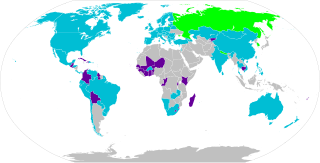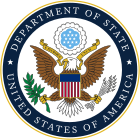International adoption is a type of adoption in which an individual or couple residing in one country becomes the legal and permanent parent(s) of a child who is a national of another country. In general, prospective adoptive parents must meet the legal adoption requirements of their country of residence and those of the country whose nationality the child holds.
The Bureau of Consular Affairs (CA) is a bureau of the United States Department of State reporting to the under secretary of state for management. The mission of the Bureau is to administer laws, formulate regulations and implement policies relating to the broad range of consular services and immigration. As of 2021, the bureau is headed by the Assistant Secretary of State for Consular Affairs, Rena Bitter.

The National Center for Missing & Exploited Children (NCMEC) is a private, nonprofit organization established in 1984 by the United States Congress. In September 2013, the United States House of Representatives, United States Senate, and the President of the United States reauthorized the allocation of $40 million in funding for the National Center for Missing & Exploited Children as part of Missing Children's Assistance Reauthorization Act of 2013. The current chair of the organization is Jon Grosso of Kohls. NCMEC handles cases of missing or exploited children from infancy to young adults through age 20.

The Hague Convention on the Civil Aspects of International Child Abduction or Hague Abduction Convention is a multilateral treaty that provides an expeditious method to return a child internationally abducted by a parent from one member country to another. The convention was drafted to ensure the prompt return of children who have been abducted from their country of habitual residence or wrongfully retained in a contracting state not their country of habitual residence.
The China Center of Adoption Affairs (CCAA) was established on June 24, 1996 by China's Ministry of Civil Affairs. The CCAA is responsible for the welfare of children in the care of Child Welfare Institutes (orphanages), domestic adoption, and international adoption.

International child abduction in Japan refers to the illegal international abduction or removal of children from their country of habitual residence by an acquaintance or family member to Japan or their retention in Japan in contravention to the law of another country. Most cases involve a Japanese parent taking his/her children to Japan in defiance of visitation or joint custody orders issued by Western courts. The issue is a growing problem as the number of international marriages increases. Parental abduction often has a particularly devastating effect on parents who may never see their children again.
Child laundering is a scheme whereby intercountry adoptions are effected by illegal and fraudulent means. It may involve the trafficking of children and the acquisition of children through payment, deceit and/or force. The children may then be held in sham orphanages while formal international adoption processes are used to send the children to adoptive parents in another country.
The Ministry of Women, Families and Human Rights (MMFDH), former Ministry of Human Rights (2016–2018) and Secretariat for Human Rights of the Presidency of the Republic (1997–2015) is an office attached to the Presidency of Brazil. Its purpose is to implement, promote, and protect human rights, civic rights, and the rights of children, adolescents, women, families, the elderly, and the disabled.

The Hague Convention on Protection of Children and Co-operation in Respect of Intercountry Adoption is an international convention dealing with international adoption, child laundering, and child trafficking in an effort to protect those involved from the corruption, abuses, and exploitation which sometimes accompanies international adoption. The convention has been considered crucial because it provides a formal international and intergovernmental recognition of intercountry adoption to ensure that adoptions under the convention will generally be recognized and given effect in other party countries.
Child abduction or child theft is the unauthorized removal of a minor from the custody of the child's natural parents or legally appointed guardians.

Mexico is amongst the world's most popular sources and destinations for international child abduction while also being widely regarded as having one of the least effective systems of protecting and returning internationally abducted children within its borders.
The term international child abduction is generally synonymous with international parental kidnapping,child snatching, and child stealing. However, the more precise legal usage of international child abduction originates in private international law and refers to the illegal removal of children from their home by an acquaintance or family member to a foreign country. In this context, "illegal" is normally taken to mean "in breach of custodial rights" and "home" is defined as the child's habitual residence. As implied by the "breach of custodial rights," the phenomenon of international child abduction generally involves an illegal removal that creates a jurisdictional conflict of laws whereby multiple authorities and jurisdictions could conceivably arrive at seemingly reasonable and conflicting custodial decisions with geographically limited application. Such a result often strongly affects a child's access and connection to half their family and may cause the loss of their former language, culture, name and nationality, it violates numerous children's rights, and can cause severe psychological and emotional trauma to the child and family left behind.
The Hague Convention on the Civil Aspects of International Child Abduction, commonly referred to as the Hague Abduction Convention, is a multilateral treaty developed by the Hague Conference on Private International Law. The treaty provides an expeditious method of returning a child taken illegally from one country to another. It was concluded on October 25, 1980

International child abduction in Brazil comprises cases in which the removal of a child by one of the joint holders of custody or non-custodial or contested parents to Brazil in contravention of other laws of other countries and/or the desires of other custody claimants. The phenomenon of international child abduction is defined in international law and legislated on by the Hague Convention on the Civil Aspects of International Child Abduction, which entered into force in Brazil on January 1, 2000 and aims to trace abducted children, secure their prompt return to the country of habitual residence and organize or secure effective rights of access. In 2010 Brazil was accused by the US State Department of being non-compliant with the Hague Convention.
Abbott v. Abbott, 560 U.S. 1 (2010), was a decision by the Supreme Court of the United States holding that a parent's ne exeat right is a "right to custody" under the Hague Convention on the Civil Aspects of International Child Abduction and the US International Child Abduction Remedies Act. The child thus should have been returned to Chile, the country of "habitual residence" because the mother violated the ne exeat right of the father when taking the child to the United States without the father's consent.

As a result of its high level of immigration and emigration and its status as common source and destination for a large amount of international travel the United States has more incoming and outgoing international child abductions per year than any other country. To address this issue the United States played an active role in the drafting of the 1980 Hague Convention on the Civil Aspects of International Child Abduction Although the United States was one of the first nations to sign the Convention in 1981 the Convention did not enter into force for the US until 1988 with the enactment by Congress of the International Child Abduction Remedies Act which translated the Convention into US law.
The Special Advisor for International Children's Issues is a foreign policy position created by Secretary of State Hillary Clinton and announced on July 1, 2010. Susan S. Jacobs is the first person to fill the newly created role of Special Advisor for International Children's Issues. Working with the Office of Children's Issues, the Special Advisor actively engages with foreign government officials to protect the welfare and interests of children.

Adoption in the Philippines is a process of granting social, emotional and legal family and kinship membership to an individual from the Philippines, usually a child. It involves a transfer of parental rights and obligations and provides family membership. The Department of Social Welfare and Development (DSWD) defines adoption as a "socio-legal process of giving a permanent family to a child whose parents have voluntarily or involuntarily given up their parental rights."

The Preventing Sex Trafficking and Strengthening Families Act is a US bill that would address federal adoption incentives and would amend the Social Security Act (SSA) to require the state plan for foster care and adoption assistance to demonstrate that the state agency has developed policies and procedures with respect to the children it is working, and which are (possibly) a victim of sex trafficking or a severe form of trafficking in persons. The bill furthermore requires states to implement the 2008 UIFSA version, which is required so the 2007 Hague Maintenance Convention can be ratified by the US.










